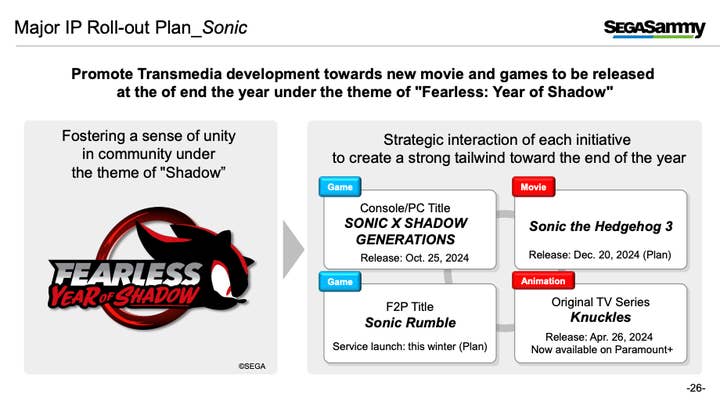The former Hollywood exec looking to transform Sega into the next Disney
We talk to Justin Scarpone about Sega's transmedia strategy, and its vision to make it a global entertainment company
As part of its latest financial report, Sega highlighted that it plans on building on the current momentum of its games business by "accelerating the transmedia development of the group's IP."
This strengthening of its transmedia strategy has been at the heart of the firm for a few years now, with the success of the Sonic films of course, but also the Angry Birds Movies, a Like A Dragon series for Amazon Prime, a recently announced Shinobi series with Universal Pictures, and more.
Earlier this year, it appointed former Disney exec Justin Scarpone as head of global transmedia to spearhead those efforts. We caught up with him at Gamescom Asia last month, with Scarpone telling us he wants to help make Sega an entertainment company that can compete on the global stage.
"Honestly, my aspiration for my time at Sega is that this is a great global gaming company, and through the transmedia segment in our initiatives, [I want to] help them become a great entertainment company. And it's a very grandiose statement but I'm pretty earnest about that.
"Gaming is [today] the irreplaceable form of entertainment for the entire world, far greater than any other form of entertainment, [and] it's high time that there is a replication of the studio system from Hollywood for the gaming industry."
He adds that it's a model that would work for the "top five, top ten global game IP companies," where games would introduce new IP, from which sequels could be made, and the property expanded and licensed in a Marvel-style approach. Scarpone spent 17 years at Disney, so it's a strategy that he's very familiar with.
"Game companies don't have that content flywheel history that Walt Disney basically invented, of taking that IP and having a five-year, ten-year roadmap of content, like Kevin Feige does for the films," he continues. "And connecting that into all the other businesses and evolving story over these different experiences, you know, content product and services.
"It's high time that there is a replication of the studio system from Hollywood for the gaming industry"
"Helping Sega get to that level of proficiency is kind of my mission. If I can leave – whenever I leave – and we're just really good storytellers that are always planning for the next franchise, for the next release of a popular franchise, working on the merchandise a year before the game's released, and work on the next film two years before the game's going to be released because it's all coordinated… That's kind of the big thing that a Disney or a Warner Bros has that a games company still does not have. But I think Sega is nudging closer to that."
He notes that it's not an accident that Shadow is not only the lead character in the Sonic the Hedgehog 3 film releasing next month, but is also a core component of Sonic X Shadow Generations, which Sega released last month.
"And [there are] things we're doing on other channels: Shadow merchandise, Shadow character appearances... We want to turn Shadow into an evergreen, individual character. That's all planned."
Sega's first half financial report highlighted how the firm is expecting "an increase in character licensing revenues from transmedia development centred on Sonic," with a slide also showing how the company's different Sonic-focused media are feeding off each other (see below).

In more practical terms, Sega's transmedia unit is divided into several teams, with Scarpone brought in to unite and build them up since last April.
"I was inheriting a core team in the US that was very strong and had some momentum around the [Sonic] IP in particular, and [there] was a clear set of strategies around where we wanted to take it," he recalls.

"So the six months and change that I've been in the company, have been very much about moving as quickly as I can to the large focus of building out the organisation capabilities, diversifying the team a little bit in terms of region and skillset, and then bringing in some people and really clarifying the vision for the team so that it's easy for them to do their jobs and be successful."
Sega mainly has two teams now looking after the cross-media initiatives of its IP: Transmedia East and West.
"West is basically our Burbank office and UK office," Scarpone explains, saying that represents around 85 people between North America and Europe. "But we're on a trajectory to get that up to 100 by the end of the fiscal [year]."
Until Scarpone joined, the Burbank office was exclusively focused on Sonic, encompassing the films and the consumer products business, among others.
"But because they've been successful, their reward for that is more work, of course," Scarpone smiles. "And so what I've said is: now you're 100% Sega transmedia. Which means that we need to build out the team to scale, to handle additional IP that is under-leveraged from a transmedia standpoint. Successful game franchises like Persona, Like a Dragon, and Angry Birds, and some of what we call our legacy IP, which date back more to when we were in the hardware business. But we're now announcing films and streaming services around those IPs.
"And for Asia it was a very different situation. We did not have a core team yet. We had people in different divisions doing a little bit of merch, [but] not much on the linear storytelling film or streaming. And then we had [a] brand marketing group spread out as well. So they all consolidated under this new organisation of transmedia."
"There's a really high affinity for the broad set of IP across the region. And sales in Asia of Sega games, particularly thanks to the Steam platform, are really growing"
He highlights that Sega's transmedia efforts in Asia are "probably two or three years in the process behind where the US and Europe are" but notes some advantages of the firm's Asian branch.
"There's a really high affinity for the broad set of IP across the region. And sales in Asia of Sega games, particularly thanks to the Steam platform, are really growing."
He takes the example of the launch of Metaphor: ReFantazio in early October: the title sold well in Japan, but it also performed extremely positively across the entire Asian continent, he tells us.
"So now it's about gearing up our organisation, building that up in Asia as well, to scale. So I think we're close to 40 people now and it's heavily weighted in Tokyo. The next phase of that is putting people in China. We just hired in Korea, hired here [in Singapore], but just gradually scaling that as the revenue scales."
When it comes to the Asian market, a topic we particularly focused on as we met in the context of Gamescom Asia, Scarpone says it's all about having properties that cater to this fragmented market's tastes.
"From a transmedia standpoint, I would say [IP like Sonic and Angry Birds were] were less successful [in Asia] but a smaller percentage of our overall P&L. Asia overall, if you look at transmedia, our P&L is much more balanced between the different IPs. And I think my gut tells me that the ultimate mix, as we try to grow all of these, will still look very different from the US.
"If you had to ask me today, probably the biggest single consumer products opportunity in the next three years in China, for example, I would probably say Persona. And the number two may actually be what we call Project Sekai, which is the mobile and PC title we have that leverages the Hatsune Miku IP, which we only partially own. We own all the rights on consumer products and we publish the game with our partner Crypton. That monetises in consumer products extremely well in Asia. Less so in the West.
"The Chinese licensee and retail reaction to Persona, and Metaphor now, has been somewhat overwhelming to me. I didn't expect it to be that strong"
"And Persona [is] a massive upside. The Chinese licensee and retail reaction to Persona, and Metaphor now, has been somewhat overwhelming to me. I didn't expect it to be that strong."
Looking ahead, Scarpone says the winning recipe to make a transmedia strategy successful for other Sega IPs, similarly to what Sonic and Angry Birds have achieved in the West, is "moreso about organisation and process" than anything else.
Different IPs will be handled in different ways depending on where they hail from, for instance.
"So, in the case of the Atlus properties, [Katsura Hashino, Persona's director] is based in Japan. So one of the challenges is, how do we work to take some of that DNA and put it in other territories?"
He continues: "So it depends on the property. Like a Dragon is kind of like Persona – it would be Japan-led. Sonic is really US-led, Angry Birds obviously [is] through Rovio, and then we have another pillar, which we call Legacy, which is all the IP from the hardware days, the Shinobis and the Streets of Rages and the Virtua Fighters, all that great stuff."To that effect, Sega just hired LucasFilm veteran Hez Chorba as VP of business and creative for Transmedia West, who will focus particularly on Sega legacy IP.
"After LucasFilm, he worked at Universal in LA and I sort of said, 'hey, can you run this thing?' Because at heart, he's a storyteller. And for our Legacy titles, most of the fandom is in the western territories. So we need a western storyteller to augment that lore and work with the studios in Tokyo who are making new versions of those games today."
"I think Sega's positioned to grow on the back of this evolution of our company into an entertainment company"
Concluding our chat, we ask Scarpone for his vision and ambitions going forward, in particular in the context of the challenging times the industry is going through.
"Well, there's the challenges that the core industry is going through at the moment, but at the same time we must have perspective that it's no longer a question: games is the primary form of entertainment on the planet. So, these are first-world problems.
"And it's tough if you've been made redundant. I've experienced that. So I understand, I do. But my perspective at the moment is: there's so much positive momentum on game IP, in linear formats, be it streaming platforms [or] film studios wanting game IP, and there's also momentum [of] those studios wanting Japanese IP."
He points out that, in addition to its games, Sega also owns animation studio Tom's Entertainment, which has experienced great success at the Japanese box office with Detective Conan this year (an IP also known as Case Closed in North America). So Scarpone says it's all about knowing how to leverage Sega's wide range of IP going forward to create more games and stories, and introduce new IP over time.
"I think Sega's positioned to grow on the back of this evolution of our company into an entertainment company. There's other gaming companies going in the same direction and with varying degrees of success, that we respect, and Nintendo is a great one, right? They're sort of the big brother to all the Japanese game companies…
"But I think we're doing pretty good and there's a lot of more opportunities for us to evolve what the Sega brand means to consumers around the world. So that's what I want to achieve."

